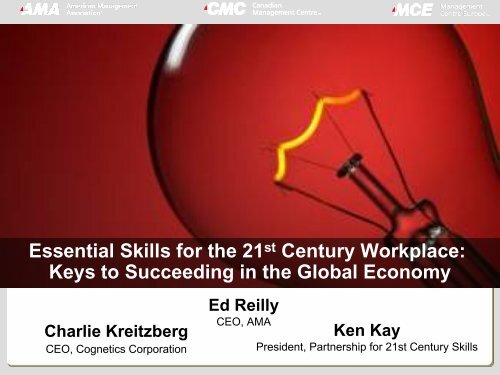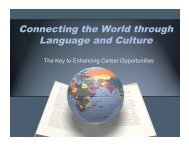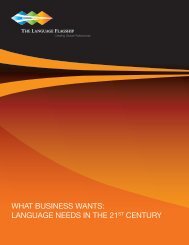Essential Skills for the 21st Century Workplace - Network of ...
Essential Skills for the 21st Century Workplace - Network of ...
Essential Skills for the 21st Century Workplace - Network of ...
Create successful ePaper yourself
Turn your PDF publications into a flip-book with our unique Google optimized e-Paper software.
<strong>Essential</strong> <strong>Skills</strong> <strong>for</strong> <strong>the</strong> <strong>21st</strong> <strong>Century</strong> <strong>Workplace</strong>: Keys to Succeeding in <strong>the</strong> Global Economy<br />
<strong>Essential</strong> <strong>Skills</strong> <strong>for</strong> <strong>the</strong> 21 st <strong>Century</strong> <strong>Workplace</strong>:<br />
Keys to Succeeding in <strong>the</strong> Global Economy<br />
Charlie Kreitzberg<br />
CEO, Cognetics Corporation<br />
Ed Reilly<br />
CEO, AMA<br />
Ken Kay<br />
President, Partnership <strong>for</strong> <strong>21st</strong> <strong>Century</strong> <strong>Skills</strong>
Today’s Speakers<br />
Ken Kay is president <strong>of</strong> <strong>the</strong> Partnership <strong>for</strong> <strong>21st</strong> <strong>Century</strong> <strong>Skills</strong>, an<br />
organization dedicated to promoting a new vision <strong>of</strong> what students<br />
need to be successful in a globally competitive economy. Ken also<br />
serves as <strong>the</strong> CEO and co-founder <strong>of</strong> <strong>the</strong> e-Luminate Group, an<br />
education consulting firm specializing in marketing communications .<br />
Charles B. Kreitzberg founded Cognetics Corporation in 1982. Dr.<br />
Kreitzberg, who is currently CEO <strong>of</strong> Cognetics, was Director <strong>of</strong><br />
Technology Research/Development at <strong>the</strong> Educational Testing<br />
Service in Princeton, New Jersey. In 1972, with his long-time<br />
colleague Ben Shneiderman, he published one <strong>of</strong> <strong>the</strong> first books on<br />
usability: The Elements <strong>of</strong> Fortran Style.<br />
Edward T. Reilly is president and chief executive <strong>of</strong>ficer <strong>of</strong> American<br />
Management Association. Reilly previously served as president and<br />
chief executive <strong>of</strong>ficer <strong>of</strong> Big Flower Holdings, Inc. Prior to that, he<br />
spent over 25 years in a variety <strong>of</strong> senior executive positions with<br />
The McGraw-Hill Companies.
What is <strong>the</strong><br />
Partnership <strong>for</strong> 21 st <strong>Century</strong> <strong>Skills</strong><br />
www.<strong>21st</strong>centuryskills.org<br />
What is <strong>the</strong> Partnership <strong>for</strong> 21 st <strong>Century</strong> <strong>Skills</strong>
PS21 Members
Overview<br />
What are <strong>the</strong> key skills that<br />
young people and workers<br />
need in <strong>the</strong> 21 st century
How <strong>the</strong> demand <strong>for</strong> skills has changed<br />
Economy-wide measures <strong>of</strong> routine and non-routine task input (US)<br />
Mean task input as percentiles <strong>of</strong> <strong>the</strong> 1960 task distribution<br />
(Levy and Murnane)
Why 21 st <strong>Century</strong> <strong>Skills</strong><br />
• What skills are most important <strong>for</strong> job<br />
success when hiring a High School graduate
Why 21 st <strong>Century</strong> <strong>Skills</strong><br />
• Of <strong>the</strong> High School Students that you<br />
recently hired, what were <strong>the</strong>ir deficiencies
Why 21 st <strong>Century</strong> <strong>Skills</strong><br />
• What skills and content areas will be<br />
growing in importance in <strong>the</strong> next five years
We need to<br />
develop <strong>the</strong><br />
life, learning and<br />
innovation skills<br />
that are most important<br />
in <strong>the</strong> workplace<br />
<strong>Skills</strong> Development
The P21 Framework<br />
Business Community Focus<br />
Educational Community Focus
The P21 Framework<br />
Core Subjects<br />
•Economics<br />
• English<br />
•Government<br />
•Arts<br />
•History<br />
•Geography<br />
• Reading or Language<br />
Arts<br />
•Ma<strong>the</strong>matics<br />
•Science<br />
• World Languages<br />
• Civics<br />
21 st <strong>Century</strong><br />
Themes<br />
• Global Awareness<br />
• Financial, Economic,<br />
Business &<br />
Entrepreneurship<br />
Literacy<br />
• Civic Literacy<br />
•Health Literacy
The P21 Framework<br />
In<strong>for</strong>mation, Media &<br />
Technology <strong>Skills</strong><br />
• In<strong>for</strong>mation Literacy<br />
• Media Literacy<br />
• ICT (In<strong>for</strong>mation,<br />
Communications &<br />
Technology) Literacy
The P21 Framework<br />
Life & Career <strong>Skills</strong><br />
• Flexibility & Adaptability<br />
• Initiative & Self-Direction<br />
• Social & Cross-Cultural <strong>Skills</strong><br />
• Productivity & Accountability<br />
• Leadership & Responsibility
The P21 Framework<br />
Learning & Innovation <strong>Skills</strong><br />
• Critical Thinking & Problem Solving<br />
• Creativity & Innovation<br />
• Communication & Collaboration
21 st <strong>Century</strong> <strong>Skills</strong> Framework
Conclusion<br />
Are your students:<br />
• Problem solvers<br />
• Good communicators<br />
• Good collaborators<br />
• In<strong>for</strong>mation and technology literate<br />
• Innovative and creative<br />
• Globally competent<br />
• Financially literate<br />
• Critical thinkers
Conclusion<br />
Are our students ready <strong>for</strong><br />
<strong>the</strong> new global economy
Why We Need Better Critical Thinking<br />
The Challenger Explosion<br />
Enron<br />
The Financial Meltdown<br />
…and many more<br />
September 11…
21 st <strong>Century</strong> <strong>Skills</strong><br />
We’re in a time <strong>of</strong> great change…<br />
…with no road-map.
Economic Propositions<br />
• We need an educated<br />
population that can deal with<br />
issues beyond than <strong>the</strong> mass<br />
reproduction <strong>of</strong> products<br />
• Need to be able to think clearly
The 21 st <strong>Century</strong> Corporation<br />
• Flatter organizations<br />
• Companies expect<br />
workers to act and react<br />
across <strong>the</strong> board<br />
• Speed and flexibility<br />
• Workers need to think<br />
like a CEO<br />
• What is <strong>the</strong> mission and<br />
<strong>the</strong> vision <strong>of</strong> <strong>the</strong><br />
organization
Global Competition<br />
• Program <strong>for</strong> International Student<br />
Assessment (PISA) exam<br />
• American students repeatedly score lower<br />
than international students<br />
• International students focus on critical<br />
thinking, problem solving, and applied<br />
learning<br />
• American students focus on rote<br />
memorization
“In <strong>the</strong> 21 st century,<br />
<strong>the</strong> real coin <strong>of</strong> <strong>the</strong><br />
realm is, can<br />
students look at<br />
material <strong>the</strong>y never<br />
have seen be<strong>for</strong>e<br />
and know what to<br />
do with it”<br />
Real Coin <strong>of</strong> <strong>the</strong> Realm<br />
‐ Dr. John Brans<strong>for</strong>d
Assessing Critical Thinking<br />
It’s easier to measure rote learning than critical thinking<br />
BUT if we are controlled by <strong>the</strong> cheapest option, <strong>the</strong> rest<br />
<strong>of</strong> <strong>the</strong> world will pass us by.
Critical Thinking is <strong>the</strong> Foundation <strong>for</strong> Many Key <strong>Skills</strong><br />
Technology<br />
Fluency<br />
Communication<br />
Life & Career<br />
<strong>Skills</strong><br />
Collaboration<br />
Learning &<br />
Innovation <strong>Skills</strong><br />
Global<br />
Awareness<br />
Critical Thinking
Critical Thinking <strong>for</strong> Business<br />
What does critical thinking mean<br />
in terms <strong>of</strong> business
Critical thinking <strong>for</strong> everybody<br />
• Every worker needs to be able to think<br />
critically<br />
• What is <strong>the</strong> value you add to <strong>the</strong><br />
company<br />
• The key to surviving <strong>the</strong> work world<br />
• Even at <strong>the</strong> cash register, critical<br />
thinking <strong>for</strong>:<br />
• Crisis management<br />
• Customer service
What is <strong>the</strong> big picture<br />
• Everyone makes a contribution<br />
• At Dell, 40% <strong>of</strong> productivity<br />
improvement came from <strong>the</strong> people<br />
doing <strong>the</strong> online assembly<br />
• Improvement starts from <strong>the</strong> bottom up
What can we do<br />
What can we do
What can we do in schools<br />
We need to be intentional and purposeful<br />
• Students need to aspire to critical thinking<br />
• Teach problem-solving<br />
• Project/challenge based learning<br />
• Self-direction
Self-management<br />
“At Apple, if somebody<br />
needs to be managed,<br />
<strong>the</strong>y’re no longer<br />
employable.”
Agile Critical Thinking<br />
C<br />
Critical<br />
• Action oriented<br />
• Real World Situations<br />
• Taught Using On-line Social Learning
Teaching Critical Thinking<br />
• Many, many examples<br />
• Must understand <strong>the</strong> domain to work<br />
within<br />
• Ex. Healthcare thinking is different from IT<br />
• How to influence <strong>the</strong> use <strong>of</strong> ideas<br />
• Peer-mediation as mentoring<br />
• Social media, computing, 21 st century<br />
technology
Emphasizing 21 st <strong>Century</strong> <strong>Skills</strong>…<br />
In <strong>the</strong> Schools<br />
In <strong>the</strong> <strong>Workplace</strong>
Teaching Critical Thinking<br />
We need to be on a continuous<br />
improvement cycle in a global context<br />
in which everybody is headed in this<br />
direction, or must be to compete in<br />
<strong>the</strong> global race.
It’s not a question <strong>of</strong><br />
content OR skills<br />
CONTENT!<br />
SKILLS!<br />
Content or <strong>Skills</strong><br />
But <strong>of</strong><br />
content AND skills
Do Everything!<br />
Need a fusion <strong>of</strong> content and skills<br />
Punt, pass, and kick AND read <strong>the</strong> playbook!
Technology<br />
• Content is not all that’s important<br />
• More than turning on <strong>the</strong> machine<br />
• How to use technology to:<br />
• Critically think<br />
• Communicate<br />
• Problem solve<br />
• Collaborate
Technology<br />
It’s not just about<br />
teaching people to use<br />
technology<br />
but getting people to<br />
understand how to<br />
innovate with<br />
technology
Curiosity<br />
• How are things different How are<br />
things working<br />
• These are <strong>the</strong> keys to moving <strong>for</strong>ward
Curiosity<br />
Motivation<br />
Drive<br />
Self‐Direction<br />
Curiosity, Motivation, Drive, Self-Direction<br />
• Curiosity should be encouraged<br />
• Young people are not taught to define <strong>the</strong> next<br />
step on <strong>the</strong>ir own<br />
• What are we doing in our culture to encourage<br />
this
<strong>Essential</strong> <strong>Skills</strong> <strong>for</strong> <strong>the</strong> <strong>21st</strong> <strong>Century</strong> <strong>Workplace</strong><br />
Ken Kay<br />
The Partnership <strong>for</strong><br />
21 st <strong>Century</strong> <strong>Skills</strong><br />
Ed Reilly<br />
American<br />
Management<br />
Association<br />
Charlie Kreitzberg<br />
Cognetics<br />
Corporation
AMA Solution<br />
Critical Thinking<br />
Seminar #2533<br />
■ Be able to use critical thinking skills when making business<br />
decisions and taking action<br />
■ Select specific techniques to improve how you recognize<br />
assumptions, evaluate arguments or draw conclusions<br />
■ Know how to take abstract ideas and make <strong>the</strong>m more tangible<br />
■ Be more aware <strong>of</strong> how emotion, time pressure, style and limited<br />
resources affect your thought processes and decisions<br />
Use Promo Code: LCVA <strong>for</strong> $100 Discount<br />
(you must register be<strong>for</strong>e April 9, 2010)<br />
www.amanet.org or 1-800-262-9699
Webinars<br />
• March 18: Ignite Your Creative Spark: Tapping Your<br />
Intuition to Spot and Seize Opportunities<br />
• March 23: How to Motivate and Engage Your Employees<br />
Without Spending a Dime<br />
• March 25: How to Write a Darn Good Email<br />
• April 06: How to Exert Your Authority to Lead: 12 Steps<br />
to Power Presence<br />
• April 08: How to Be a Successful Manager as an Introvert<br />
• April 15: 7 Fatal High-Stakes Presentation Traps and How<br />
to Avoid Them<br />
Follow us on @AMANET <strong>for</strong> <strong>the</strong><br />
latest updates on AMA Webinars, Webcasts,<br />
and Podcasts<br />
For details and registration, visit: www.amanet.org/events
Questions and Answers<br />
Questions and Answers<br />
www.amanet.org




